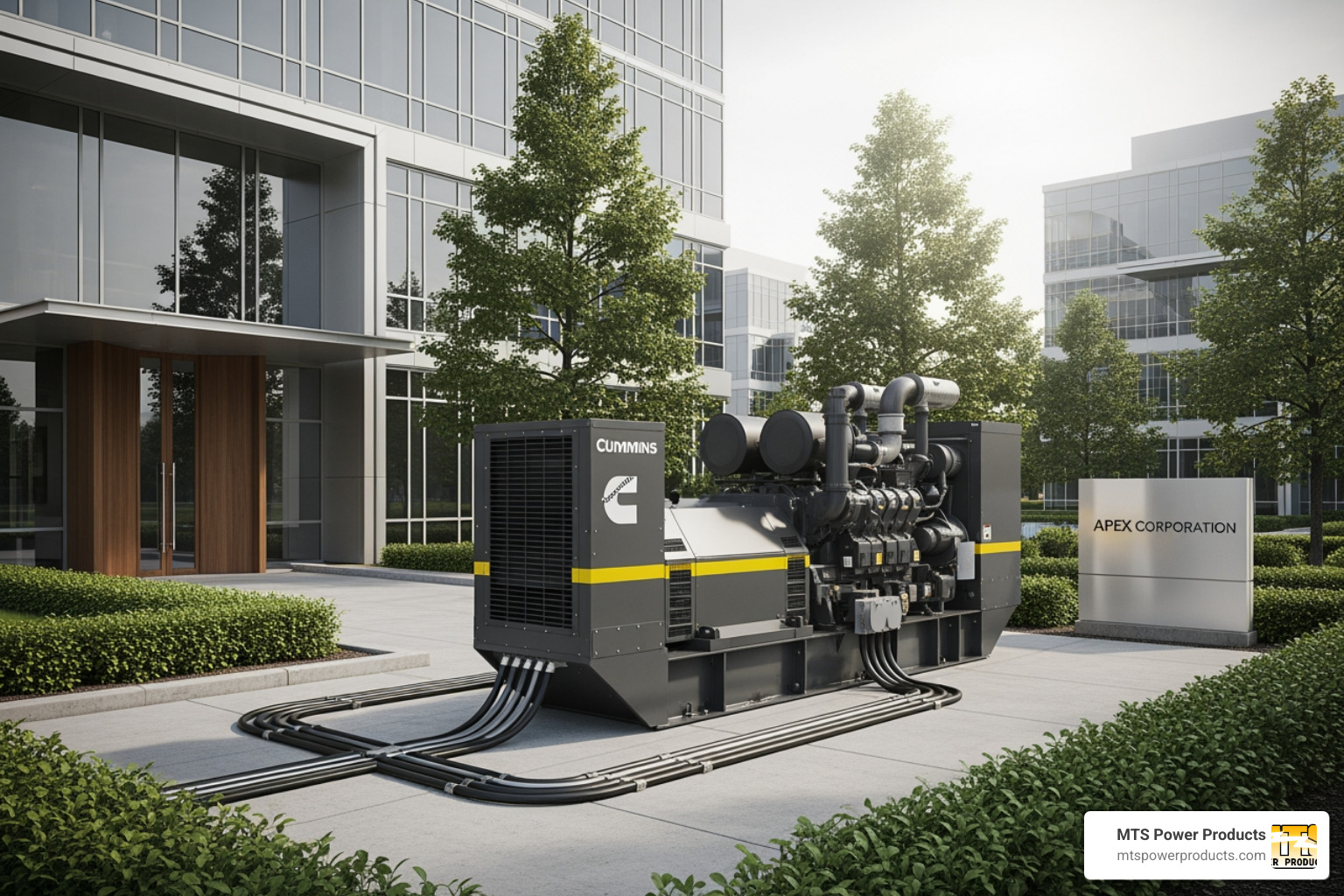
Buy Direct
from the Manufacturer
Sell our Products
Become a Distributor
Discounts
on volume purchases
Visit Us
at our Miami office
from the Manufacturer
Become a Distributor
on volume purchases
at our Miami office
Understanding the diesel generator for home price is key to keeping your lights on during outages. Many homeowners are looking for reliable backup power. A good generator brings peace of mind when the grid goes down.
Here’s a quick look at typical price ranges for diesel generators suitable for home backup:
These prices are for the generator unit itself. They do not include installation costs, which can add significantly to the total.
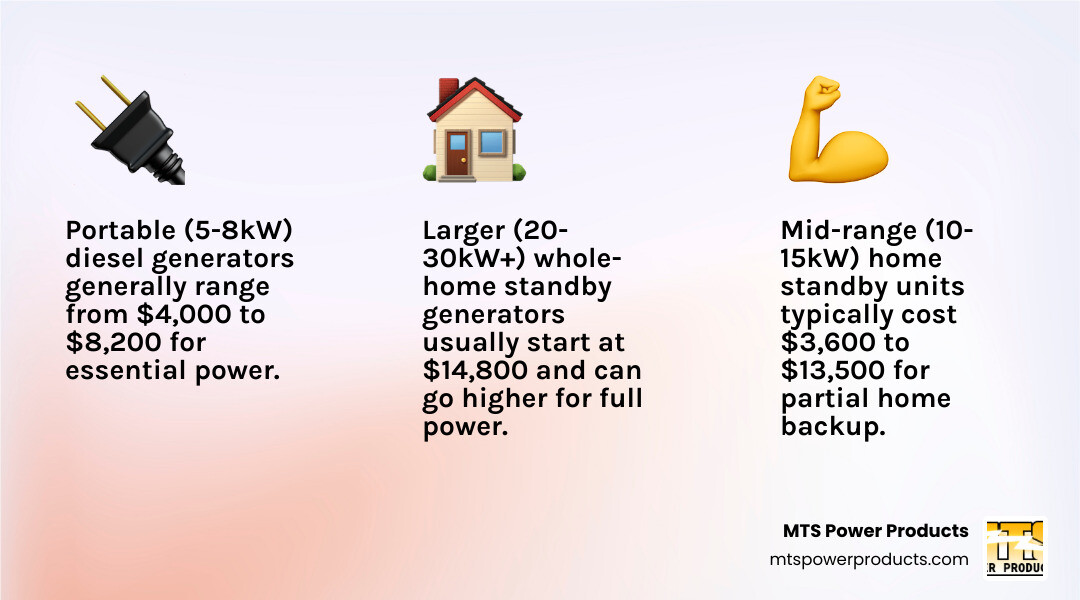
Simple guide to diesel generator for home price terms:
When you’re exploring the diesel generator for home price, the first step is understanding what options are actually available. Think of it like shopping for a car – you wouldn’t compare a compact sedan to a pickup truck, right? The same logic applies here.
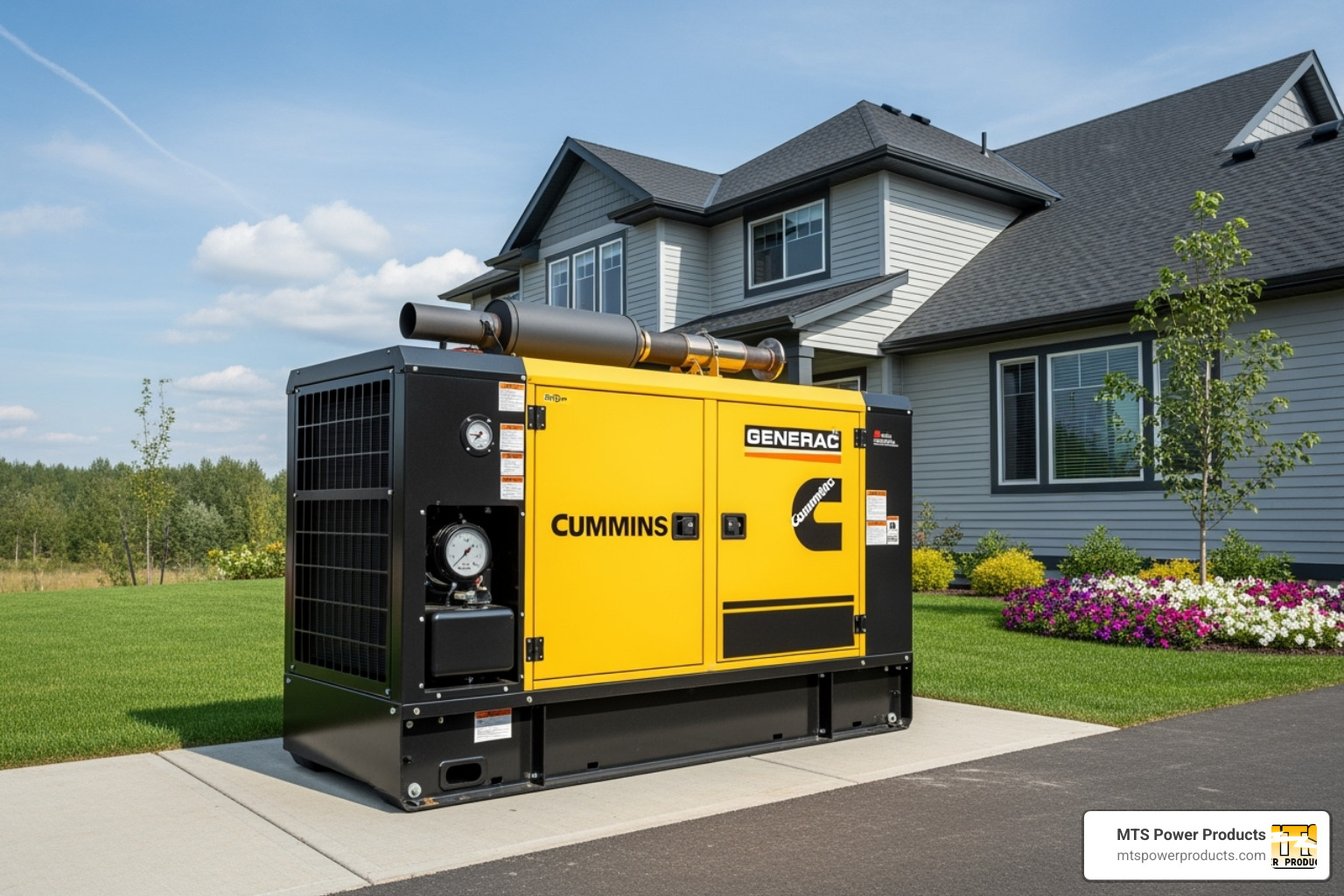
There are two main types of diesel generators for your home, and they’re designed for completely different situations. You’ve got portable diesel generators for flexibility and home standby diesel generators for that “set it and forget it” peace of mind.
Here’s something important to know about power output and engine speed. Generators come with different kilowatt ratings (that’s your power capacity) and run at either 1800 RPM or 3600 RPM. We always recommend 1800 RPM engines for home standby units because they’re built for the long haul. They run quieter, last longer, and handle extended operation much better. Plus, these engines are liquid-cooled, which means they stay happy even during those long Florida summer outages.
Think of portable diesel generators as your “grab and go” backup power solution. They’re designed for portability and immediate emergency use when you need power fast. These units typically offer lower wattage – usually between 5kW to 8kW – which makes them perfect for powering your essential circuits during an outage.
The beauty of portable units is their flexibility. You can use them for emergency use around the house, take them camping, or even bring them to a job site. However, they do require manual connection to your home’s electrical system. This usually means running extension cords or connecting through a basic transfer switch.
What you’re getting is temporary backup power that’s budget-friendly and versatile. When the lights go out, you can have these units running your refrigerator, a few lights, and maybe your internet router within minutes. It’s not whole-house power, but it’ll keep your essentials running until the grid comes back online.
Now we’re talking about the premium backup power experience. Home standby diesel generators are the “luxury sedan” of backup power – they’re permanently installed, operate automatically, and can power your entire home without you lifting a finger.
These systems feature automatic operation through an Automatic Transfer Switch (ATS). When the power goes out, your generator detects it within seconds, starts itself up, and seamlessly takes over your home’s electrical load. When utility power returns, it automatically switches back and shuts down. It’s like having a personal power plant that works 24/7.
The real advantage is whole-house power. We’re talking about higher power capacity – typically 10kW to 50kW or more – that can run everything from your air conditioning to your home office setup. Yes, they require professional installation, but that’s what ensures everything works safely and reliably.
The diesel generator for home price for standby units is higher upfront, but you’re investing in true energy independence. No more worrying about spoiled food, uncomfortable nights, or missing important work calls during outages.
When you’re shopping for backup power, understanding the diesel generator for home price is essential for making a smart investment. The sticker price you see is just the beginning of your total investment, but it’s a great place to start planning your budget.
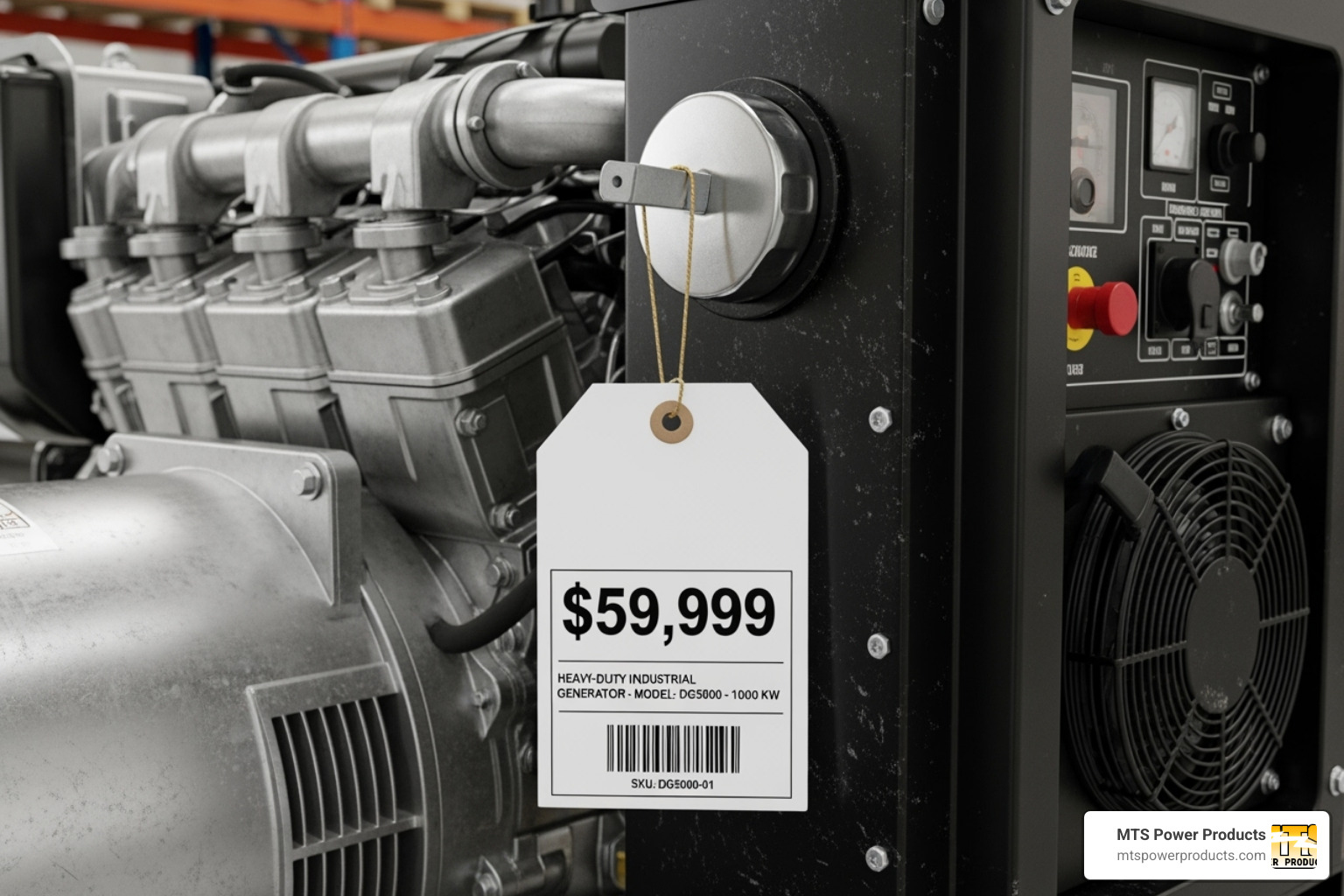
The truth is, generator pricing isn’t just about the wattage – though that’s a big factor. Your final cost depends on the generator’s features, build quality, and whether you’re going portable or permanent. But here’s the thing many homeowners don’t realize: the additional costs can sometimes equal or even exceed the generator’s price tag.
Let’s break down what you can expect to spend based on your power needs and setup preferences.
Portable diesel models in the 5kW to 8kW range offer the most budget-friendly entry into reliable diesel backup power. You’re looking at $4,000 to $8,200 for these workhorses. Take the popular 5000-Watt portable unit at around $4,020 – it’s perfect for keeping your essentials running during shorter outages. If you need a bit more juice, an 8 kW model will run you about $8,199 and can handle several major appliances at once.
Standby diesel models between 10kW and 25kW represent the sweet spot for most homeowners who want that “set it and forget it” peace of mind. Here’s where the diesel generator for home price gets more interesting, ranging from $3,600 to $17,000 depending on what you’re powering.
A 10kW standby unit with WiFi monitoring starts around $3,579 – surprisingly affordable for automatic whole-house backup. Step up to a 15kW unit with advanced mobile connectivity, and you’re looking at about $13,437. For families with higher power demands, a 20kW system runs around $14,797, while a robust 30kW model hits about $16,997.
We also offer professional-grade options like our AGL15KW unit that includes the automatic transfer switch for $6,495 – a complete package that’s ready for professional installation.
Larger standby diesel models at 30kW and beyond are for those serious about never losing power, no matter what. These powerhouses can cost well over $20,000. A 40kW system starts at $20,869, and if you’re looking at commercial-grade 100kW units, you’re in the $28,705 to $32,670 range. While that might be overkill for most homes, it shows you the upper limits of what’s possible.
Here’s where many homeowners get surprised – the generator is just part of your total investment.
Transfer switch costs can add several hundred to a few thousand dollars to your project. While some packages include the automatic transfer switch, it’s often separate. This critical component safely manages the power handoff between your utility and generator.
Professional installation isn’t optional – it’s required for safety and code compliance. A licensed electrician needs to connect everything properly, and that expertise comes with a price tag. You’ll also need a concrete pad for your generator’s foundation, plus any local permits your municipality requires.
Fuel storage is another consideration many folks overlook. Your diesel generator needs fuel to run, and for standby units, that usually means a dedicated storage tank. We always recommend proper fuel storage solutions that meet safety codes – often double-walled tanks with leak detection for maximum protection.
When you add up these extras, they can easily match your generator’s purchase price. But here’s the good news: you’re investing in a system that could serve your family reliably for decades. That makes the math work out pretty well when you think long-term.
When you’re researching the diesel generator for home price, you’ll quickly find that it’s not just about picking the cheapest option. Several key factors work together to determine what you’ll pay, and understanding these can help you make a smart investment decision.
The biggest factor affecting your diesel generator for home price is how much power the unit can produce. This is measured in kilowatts (kW), and it directly impacts what you can run during an outage.
Think of it this way: a 10kW generator might keep your essentials running – lights, refrigerator, and a few circuits. But if you want to power your whole house, including air conditioning and electric heating, you’ll need something in the 20kW range or higher. The more power you need, the bigger and more complex the generator becomes.
For example, if you have an all-electric home with multiple air conditioning units, you might need a 30kW or larger unit. Each step up in power means a more robust engine, larger fuel system, and more sophisticated electrical components. That’s why sizing your generator correctly is so important – you don’t want to overpay for power you don’t need, but you also don’t want to be left in the dark.
The heart of any diesel generator is its engine, and this is where quality really matters. High-quality diesel engines from reputable, industry-leading manufacturers are built to last for decades of reliable service.
Here’s something interesting: 1800 RPM engines cost more upfront than 3600 RPM engines, but they’re worth every penny. Running at half the speed means less wear and tear, quieter operation, and much longer life. A quality 1800 RPM diesel engine can run for over 25,000 hours – that’s years of reliable backup power.
These engines are typically liquid-cooled, which is a huge advantage over air-cooled units. Liquid cooling helps maintain consistent temperatures, reduces maintenance needs, and extends engine life significantly. When you factor in the lower maintenance costs and longer lifespan, the higher initial diesel generator for home price often pays for itself.
Modern diesel generators come packed with features that make them more convenient and reliable, but each feature adds to the cost. The good news is that these technologies often provide excellent value.
Automatic Transfer Switches (ATS) are essential for standby units – they detect power outages and start your generator automatically. Remote monitoring capabilities let you check your generator’s status from anywhere using your smartphone or computer. Some systems even send you alerts about maintenance needs or potential issues.
Sound-dampening enclosures are another valuable feature, especially if you live in a neighborhood where noise matters. Quality units can reduce noise levels to around 70 decibels – about as loud as a normal conversation.
Advanced control panels with LCD displays give you precise control and monitoring. Features like UL Listing and code-ready configurations ensure your generator meets safety standards and local building codes, potentially saving you headaches during installation.
The complexity of installing your generator significantly affects the total diesel generator for home price. Professional installation isn’t optional – it’s required by law and essential for safety.
Your installation costs depend on several factors: electrical wiring to connect the generator to your home’s panel, fuel line connections from your storage tank, and ensuring everything meets local building codes. Some areas have specific requirements like CARB compliance for emissions.
You’ll also need a concrete pad for stability, proper ventilation, and easy access for maintenance. The distance from your electrical panel and fuel storage location can affect installation complexity and cost.
At MTS Power Products, we handle all these details to ensure your installation meets or exceeds local requirements. Our experience with South Florida installations means we know exactly what’s needed to get your system up and running safely and efficiently.
When you’re shopping for a home generator, the fuel type you choose makes a huge difference in your long-term satisfaction and costs. We’ve seen homeowners wrestle with this decision countless times. While gasoline, natural gas, and propane generators each have their place, diesel generators bring something special to the table that’s worth considering seriously.
Understanding these trade-offs helps you see the real diesel generator for home price picture – not just what you pay upfront, but what you get for your investment over the years.
Here’s how diesel stacks up against other fuel types across the features that matter most:
| Feature | Diesel Generators | Gasoline Generators | Propane Generators | Natural Gas Generators |
|---|---|---|---|---|
| Fuel Efficiency | High; higher power output per gallon, especially at high loads. | Moderate; lower efficiency, especially under heavy load. | Good; slightly less efficient than diesel/gasoline. | Good; consistent supply, but efficiency can vary. |
| Maintenance | Lower frequency; robust engines, liquid-cooled, longer intervals for servicing. | Higher frequency; air-cooled engines, more frequent oil changes. | Moderate; cleaner burn, but still requires regular checks. | Lower frequency; very clean burn, less engine wear. |
| Lifespan | Very Long; designed for thousands of hours, robust components (e.g., 25,000+ hours). | Short-Moderate; not designed for continuous heavy use. | Moderate-Long; cleaner burn than gasoline. | Very Long; continuous fuel supply, clean burn. |
| Initial Cost | Higher; robust construction, advanced engines. | Lower; most affordable upfront. | Moderate; often slightly more than gasoline. | Moderate-High; unit cost similar to diesel, but installation can be complex. |
| Fuel Storage | Excellent; long shelf life, less flammable, requires dedicated tank. | Poor; degrades quickly, highly flammable, requires frequent rotation. | Good; long shelf life, stored in pressurized tanks. | N/A; continuous supply from utility line. |
There’s a reason we’re enthusiastic about diesel generators for home backup power. These machines have earned their reputation through decades of reliable service in demanding applications.
Fuel efficiency is where diesel really shines. These engines squeeze more power out of every gallon than their gasoline cousins, especially when you’re running heavy loads like air conditioning or electric heating. An 8kW diesel generator might only sip 0.56 gallons per hour under typical use. That efficiency really adds up during extended outages.
The long engine life of diesel units is honestly impressive. We’re talking about engines built like tanks – many top-tier diesel engines are rated for over 25,000 hours of operation. To put that in perspective, if you ran your generator for 8 hours every single day, it would last over 8 years of continuous use. In reality, with typical backup use, you’re looking at decades of reliable service.
Lower maintenance needs make diesel generators surprisingly hassle-free. Their robust, liquid-cooled design means longer intervals between service visits compared to air-cooled gasoline units. You’ll spend less time and money on upkeep, which is exactly what you want from a backup power system.
Fuel stability is a game-changer for emergency preparedness. Unlike gasoline that goes stale in months, diesel fuel can sit in your tank for extended periods without degrading. When that storm hits, you know your fuel is ready to go.
The safety factor gives many homeowners peace of mind. Diesel fuel is much less flammable than gasoline, with a lower risk of accidental ignition. It’s one less thing to worry about when you’re dealing with the stress of a power outage.
We believe in being straight with our customers about the full picture. Diesel generators aren’t perfect for everyone, and there are some trade-offs to consider.
The higher initial investment is the most obvious hurdle. As you’ve seen in our pricing sections, the upfront diesel generator for home price typically runs higher than gasoline or propane alternatives. This reflects the more robust construction and advanced engineering, but it can be a shock if you’re not prepared for it.
Noise levels have traditionally been diesel’s weak spot. While modern units with sound-dampening enclosures have made huge improvements – many now operate around 70 dB, about as loud as a washing machine – they can still be more noticeable than natural gas generators. If you have close neighbors or noise restrictions, this is worth considering.
Emissions regulations vary by location and can affect your options. Some areas, particularly California with its CARB compliance requirements, have specific rules about diesel generators. We make sure all our units meet or exceed these standards, but it’s something to factor into your decision.
Fuel delivery and storage requires some planning. You’ll need a dedicated external fuel tank and periodic diesel deliveries. While diesel’s stability means you won’t be constantly rotating fuel like with gasoline, having a large tank on your property is both a logistical and aesthetic consideration.
The beauty of working with us is that we help you weigh these factors against your specific needs, budget, and local requirements. For many homeowners, the long-term benefits far outweigh the initial investment and minor inconveniences.
When you’re weighing the diesel generator for home price, looking only at the sticker price tells just part of the story. The real value becomes clear when you consider how long your generator will serve you and what it costs to keep running smoothly. Think of it like buying a car – the purchase price matters, but so does fuel economy, maintenance costs, and how many years you’ll drive it.
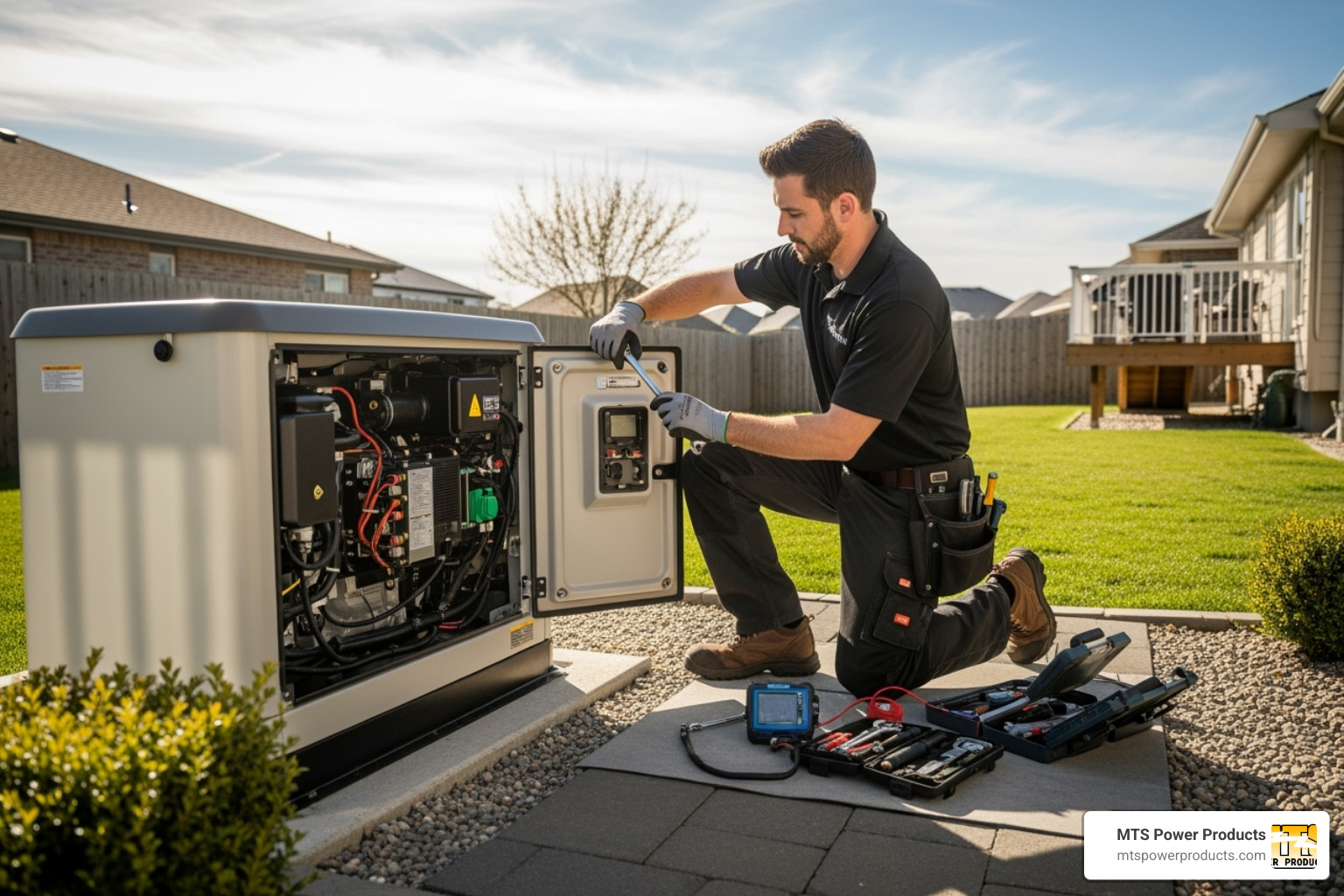
Here’s where diesel generators really shine. These workhorses are built to last, with liquid-cooled engines running at a steady 1800 RPM rather than the higher speeds of smaller generators. This slower pace means less wear and tear on engine components.
High-quality diesel engines, for example, are rated for over 25,000 hours of operation. To put that in perspective, if your generator ran for 100 hours per year (which would be quite a lot for most homes), it could serve you for over 250 years! Of course, that’s theoretical, but it shows the incredible durability built into these machines.
Regular maintenance is your generator’s best friend. Just like your car needs oil changes, your generator needs routine care to reach its full potential. The good news? Diesel engines typically need less frequent maintenance than their gasoline counterparts, thanks to their robust construction.
We found some fascinating real-world data that shows what you can actually expect. One homeowner tracked their 8kW quiet diesel generator over 262.2 hours of operation. The unit consumed 147 gallons of diesel fuel, averaging just 0.56 gallons per hour. That’s impressive fuel efficiency! You can dive deeper into this analysis with A real-world breakdown of generator operating costs.
Getting the complete picture of your diesel generator for home price means adding up all the costs over the years. It’s like calculating the true cost of owning a home – you need more than just the mortgage payment.
Annual maintenance costs are surprisingly reasonable. You’ll need oil changes, filter replacements (both air and fuel), and battery health checks. While these add up over time, they’re essential for keeping your generator ready when you need it most.
Fuel consumption varies by generator size and load. That 8kW unit we mentioned earlier used about 0.56 gallons per hour. Larger units naturally use more – a 20kW model might consume 1.03 gallons per hour at half load and 1.97 gallons per hour at full capacity. A 30kW unit uses about 1.37 gallons per hour at 50% load and 2.77 gallons per hour when working hard.
The homeowner in our real-world example calculated their immediate operating costs at about $1.75 per operating hour, which worked out to $0.349 per kWh produced. But here’s the complete picture: when they factored in depreciation and major maintenance over a 10-year period, the projected cost rose to $2.75 per operating hour or $0.515 per kWh.
This comprehensive view might seem daunting, but remember – you’re not just buying electricity. You’re buying peace of mind, food safety, home security, and comfort during outages. When the lights go out in your neighborhood and yours stay on, that value becomes crystal clear.
The higher upfront diesel generator for home price often pays for itself through superior fuel efficiency, longer lifespan, and fewer repair headaches. It’s an investment that keeps giving back, year after year.
Well, we’ve covered a lot of ground today, haven’t we? Navigating home generators can seem a bit complex at first. But understanding the diesel generator for home price and all the factors that influence it empowers you to make a truly informed decision.
We’ve explored everything from the different types of diesel generators – portable versus standby – to their typical price ranges. We also dove into those crucial extra costs, like professional installation and fuel storage, so there are no surprises. And we looked at what truly drives the price tag, whether it’s power output, engine quality, or those fantastic advanced features like remote monitoring and quiet enclosures.
Weighing the pros and cons, it’s clear that diesel power offers some compelling advantages. Think about its impressive fuel efficiency, the remarkably long life of a diesel engine, how stable the fuel is, and its inherent safety. While the initial investment might be a bit higher, and you might notice a little more noise than with some other options, the long-term value often shines through. The lower maintenance frequency and the potential for decades of reliable power truly make a diesel generator a smart investment for your home. It’s about more than just a purchase; it’s about the total cost of ownership over many, many years.
At MTS Power Products, we’re all about giving you the very best solutions for your power security. We’re proud to be a direct source for professional quality generator sets, essential generator parts, and automatic transfer switches. Plus, we’ve got our very own customized line of professional-grade power controls called McPherson Controls. These come packed with advanced features like integrated programmable displays and switch mechanisms, giving you improved control and even better safety.
You see, investing in a diesel generator for your home isn’t just a smart financial move; it’s an investment in unparalleled peace of mind. It means knowing your family will stay comfortable and safe, even when the lights go out. We’re here to help you find that perfect solution that fits your unique needs and your budget, ensuring you’re always prepared for whatever comes your way.
We’re centrally located in Miami, Florida, just minutes from the Miami International Airport and the Port of Miami, and we offer worldwide delivery. Truly, there’s no better company in South Florida to provide custom generators, transfer switches, and more.
